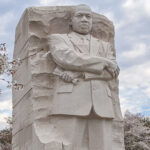Celebrating Notable African Americans in Public Health
Trust for America’s Health is celebrating Black History Month by recognizing the contributions 13 African Americans have made to public health throughout U.S. history to addressing today’s health equity challenges.
W.E.B. Du Bois (1868 – 1963)
Dr. Du Bois was a Harvard trained sociologist and scholar activist whose major and lasting impact on public health can be seen in his trailblazing ethnographic research in works such as The Philadelphia Negro and The Souls of Black Folks, Du Bois has demonstrated the social and health ramifications of racism and discrimination. Learn more about W.E.B. Du Bois
Ionia Rollin Whipper (1872 – 1953)
Dr. Whipper was a Howard University trained physician and one of few African American obstetricians in Washington, DC, during her career, Dr. Whipper became a public health reformer after learning of the unsanitary conditions of young, impoverished mothers. During World War I, Whipper served as a medical officer, public health educator and advocate throughout the South, teaching African American mothers and midwives about proper childbirth procedures and hygiene. Subsequently, she built her career on teaching and establishing organizations to improve the lives of low-income, African American women in the District of Columbia. Learn more about Ionia Rollin Whipper.
Roscoe Conkling Brown Sr. (1884 – 1963)
Dr. Brown was a dentist and public health pioneer who served in various national organizations specializing in African American health, Dr. Brown joined the United States Public Health Service and helped direct the establishment of the Office of Negro Health Work. He also became a member of President Franklin Roosevelt’s informal “Black Cabinet” to represent the specific needs of African Americans during the New Deal. He helped the Office of Negro Health Work coordinate a Negro Health Week, develop educational materials, and publish a quarterly journal on issues that specifically concern the Black community. Learn more about Roscoe Conkling Brown Sr.
Charles R. Drew (1904 – 1950)
Dr. Drew was a surgeon and medical researcher who studied blood, blood transfusions, and blood banking. He also developed a method to preserve blood plasma for transfusions that saved countless lives during the second World War due to the development of large scale blood banks. Dr. Drew was the director of the first American Red Cross Blood Bank, he also protested against racial segregation in the donation of blood. Learn more about Charles R. Drew.
Mary Beatrice Davidson Kenner (1912 – 2006)
Mrs. Kenner is an inventor who holds more patents than any other Black woman in history. She is best known for inventing the sanitary pad for menstruation. However, it took 30 years for her invention to be developed and manufactured for mainstream markets due to racial discrimination and sexism. Learn more about Mary Beatrice Davidson Kenner.
Henrietta Lacks (1920 – 1951)
Diagnosed with cervical cancer in 1951, Lacks was receiving treatment when some of her cervix cells were taken to be sent to a lab without her consent. These cells came to be known as “immortal” and have been growing indefinitely since 1951. This line of cells known as the HeLa cell line has led to biomedical breakthroughs for gene mapping, developing a polio vaccine, and understanding cancer and HIV/AIDS. Learn more about Henrietta Lacks.
Dr. Marilyn Hughes Gaston (1939 – present)
Dr. Hughes Gaston is the first African American woman to direct a Public Health Service Bureau and the second African American woman to achieve the position of Assistant Surgeon General and rank of Rear Admiral in the U.S. Public Health Service. Additionally, Dr. Gaston’s research of sickle-cell disease led to a nationwide screening program to test newborns for immediate treatment which resulted in a significant reduction of morbidity and mortality in young children around the world. Learn more about Dr. Marilyn Hughes Gaston.
Dr. David Satcher (1941 – present)
As Surgeon General and Assistant Secretary for Health, Dr. Satcher led the department’s efforts to eliminate racial and ethnic disparities in health, the initiative was incorporated as one of the two major goals of Healthy People 2010. In 2005, he was appointed to serve on the World Health Organization Commission on Social Determinants of Health Learn more about Dr. David Satcher.
Dr. Sherman A. James (1944 – present)
Dr. James is a social epidemiologist and health researcher known for studying how “high-effort” coping (“John Henryism”) over many years with adversity, including adversity caused by structural racism, contributes to the well-known high risk for hypertension, cardiovascular disease, and premature death in African Americans. Learn more about Dr. Sherman A. James.
Marsha P. Johnson (1945 – 1992)
Ms. Johnson was one of the most prominent figures in the Stonewall uprising of 1969, Johnson helped form Street Transgender Action Revolutionaries (STAR), a radical political organization that provided housing and other forms of support to homeless queer youth and sex workers in Manhattan. She also performed with the drag performance troupe Hot Peaches from 1972 through the ‘90s and was an AIDS activist with AIDS Coalition to Unleash Power (ACT UP). Learn more about Marsha P. Johnson.
Dr. Herbert W. Nickens (1947 – 1999)
Dr. Nickens was the first director of the Office of Minority Health, the first federal agency dedicated exclusively to improving health and healthcare outcomes for racial and ethnic minority communities. Dr. Nickens contributed substantively to a landmark federal report, the eight-volume Report of the Secretary’s Task Force on Black and Minority Health: A Summary and a Presentation of Health Data With Regard To Blacks, an in-depth investigation of disparities in key health indicators. The report was released on October 16, 1985, by then U.S. Secretary of Health and Human Services Margaret Heckler, and is often referred to as the “Heckler Report.” Learn more about Dr. Herbert W. Nickens.
Deborah Prothrow-Stith (1954 – present)
Physician and innovator Deborah Prothrow-Stith pioneered the idea that violence should be seen as a public health problem and a social “disease” rather than a criminal justice problem, as well as the idea that violence needs a preventative approach. Dr. Prothrow-Stith is the current dean at the Charles R. Drew University College of Medicine in Los Angeles, and she was the first woman and youngest Commissioner of Public Health in Massachusetts. Learn more about Deborah Prothrow-Stith.
Meagan Robinson
Robinson is dedicated to ensuring the effective use of data, epidemiology, and applied research in facilitating equitable, data-driven decision making. In her current role as Division Director and Epidemiologist Lead at the Virginia Department of Health, Robinson oversees a staff of more than 30 across the Division of Population Health Data, which includes four units — Maternal and Child Health Epidemiology and Evaluation, Population Health Surveys, Prevention and Health Promotion Epidemiology and Evaluation, and the Virginia Cancer Registry. Learn more about Meagan Robinson.

